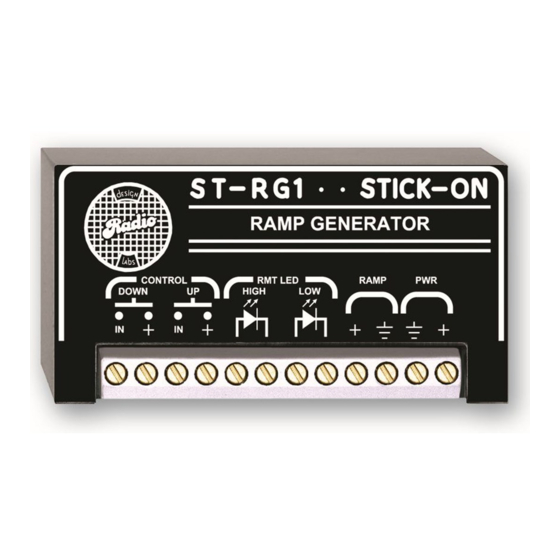
Advertisement
Table of Contents
STICK-ON
®
Model ST-RG1
Ramp Generator
Ramp Generator with 0 to 10 Volt Output
Remote Control of RDL VCA Products
Multiple VCA Remote Control Points
Dual LED Outputs for Position Indication
Ramp Output Capable of Driving Six VCAs
Buffered, De-Bounced Switch Inputs
The ST-RG1 is a digitally generated 0 to 10 volt Ramp Generator in the group of STICK-ON series products by Radio Design Labs. These
products are designed for quick, convenient installation and reliable operation in a variety of control applications. STICK-ONs are designed, built
and rated for continuous duty in professional A/V systems.
APPLICATION: The ST-RG1 provides a 0 to 10V output is the ideal interface to remotely control Voltage
Controlled Amplifiers, such as RDL's popular VCA Modules. A single VCA may now be controlled from
several locations. Only a pair of buttons (UP and DOWN) is required at each control location, or RDL's
RLC2 Remote Level Control. LED level indicator driver circuitry is included in the ST-RG1.
The ST-RG1 provides terminals for connection of two momentary buttons; one to ramp up, the other to
ramp down. This is usually accomplished with RDL's D SERIES-RLC2 Remote Level Control. When
power is applied to the ST-RG1, the output terminal is at its lowest (0 volt) point. When the UP button is
pushed, the output ramps upward. When the UP button is released, the output remains stable at the
voltage present when the button was released. When the DOWN button is depressed, the output ramps
downward as long as the button is held in. When the ST-RG1 output reaches either minimum or
maximum, it remains there until the opposite button (or closure) is applied. If the remote button is pushed
momentarily and not held in, the ramp will step 200 millivolts nominal in the selected direction.
Two LED outputs are provided. A red LED connects to the LOW output; a green connects to the HIGH
output. When the ramp is fully on (10 volts), the HIGH indicator is fully on, and the LOW is fully off. When
the ramp is at minimum, the LOW is fully on and the HIGH is fully off. The circuit is designed to vary the
current to each LED in proportion to the relative position of the ramp. If the ramp is at 5 volts then both
indicators are equally illuminated. With this system, only two LEDs are required for full visual level
indication!
The ST-RG1 provides the ideal interface for audio volume control through RDL VCA Modules. The
ST-RG1 is a ground-referenced product, which may operate from the same power supply as the RDL VCA
modules. Any number of UP and DOWN buttons may be connected to the ST-RG1, allowing VCA control
from multiple locations. The output drive current from the ST-RG1 is more than sufficient to drive six
monaural RDL VCA Modules for stereo applications.
All this is available in the unbelievable compactness and convenience of the RDL STICK-ONs. Put them
right where you need them, or design them in with our optional racking or mounting kits. Anytime you
need a 0 to 10 volt ramp generator, your simple, cost-effective solution is found in the ST-RG1!
th
RDL
659 6
SERIES
St.
Prescott, AZ., USA 86301
(928) 443-9391
FAX (928) 443-9392
www.rdlnet.com
Advertisement
Table of Contents

Summary of Contents for RDL STICK-ON ST-RG1
- Page 1 Controlled Amplifiers, such as RDL’s popular VCA Modules. A single VCA may now be controlled from several locations. Only a pair of buttons (UP and DOWN) is required at each control location, or RDL’s RLC2 Remote Level Control. LED level indicator driver circuitry is included in the ST-RG1.
- Page 2 STICK-ON SERIES ® Installation/Operation Model ST-RG1 Declaration of Conformity available from rdlnet.com. Sole EMC specifications provided on product package. Ramp Generator Specifications are subject to change without notice. TYPICAL PERFORMANCE NOTE: This equipment has been tested and found to comply with the limits for a Class B digital device, pursuant Control Inputs: 1 to ramp up, 1 to ramp down to part 15 of the FCC Rule.
Need help?
Do you have a question about the STICK-ON ST-RG1 and is the answer not in the manual?
Questions and answers